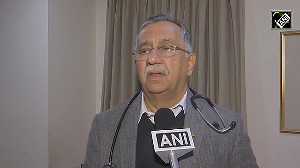The government on Thursday raised the income tax exemption limit to Rs 100,000 while imposing a 2 per cent education cess on taxable income.
Finance Minister P Chidambaram, presenting the Union Budget for 2004-05 in the Lok Sabha said the proposal to raise the IT exemption limit to Rs 1 lakh (Rs 100,000) would give relief to 1.4 crore assessees.
A person having taxable income exceeding Rs 1 lakh will now be required to pay in additional to income tax (after rebate), an education cess at the rate of 2 per cent.
The tax proposals specify that a person having income exceeding Rs 8.50 lakh would be required to pay 10 per cent surcharge on the total income tax payable after the rebate, and also the education cess.
For example, an individual with a taxable income of Rs 1 lakh (after standard deductions at the old rate) will not be required to pay any income tax, while a person having
taxable income of Rs 1.50 lakh will now have to pay an income tax of Rs 19,380 (including the education cess).
An individual having a taxable income of Rs 8.50 lakh will have to pay an income tax of Rs 2,33,580 (Rs 4,580 more than what he paid last year).
Family pension received by widows, children and nominated heirs of members of the armed forces and the paramilitary forces killed in action will be exempted from income tax.
The benefit of Section 80 DD and Section 80U is being extended to people suffering from autism, cerebral palsy and multiple disability.
Compensation for acquisition of agricultural land in certain urban agglomerations is to be exempted from capital gains tax in cases where the compensation or the enhanced compensation has been received on or after April 1, 2004.
Gifts from unrelated persons above the limit of Rs 25,000 is to be taxed as income while gifts received from blood relations, lineal ascendants and lineal descendants and gifts received on the occasion of marriage up to a limit of Rs 1 lakh will continue to be exempt from tax computation.
Tax on long-term capital gains from securities transactions is to be abolished and instead a tax on transactions in securities on stock exchanges is to be levied on the buyer at the rate of 0.15 per cent of the security value.
This means that a transaction involving securities valued at Rs.one lakh will now bear a small tax of Rs 150 and this will be levied on the buyer. The rate of tax on short-term capital gains from securities has been reduced to a flat rate of 10 per cent.
Announcing these measures, the finance minister said that out of nearly 3.40 crore (34 million) people filing income tax returns, only 2.70 crore (27 million) assessees are tax payers and the new proposals will give relief to 1.40 crore (14 million) assessees.
Chidambaram assured the House that if the tax compliance improves, he may revisit the subject.






 © 2025 Rediff.com -
© 2025 Rediff.com -